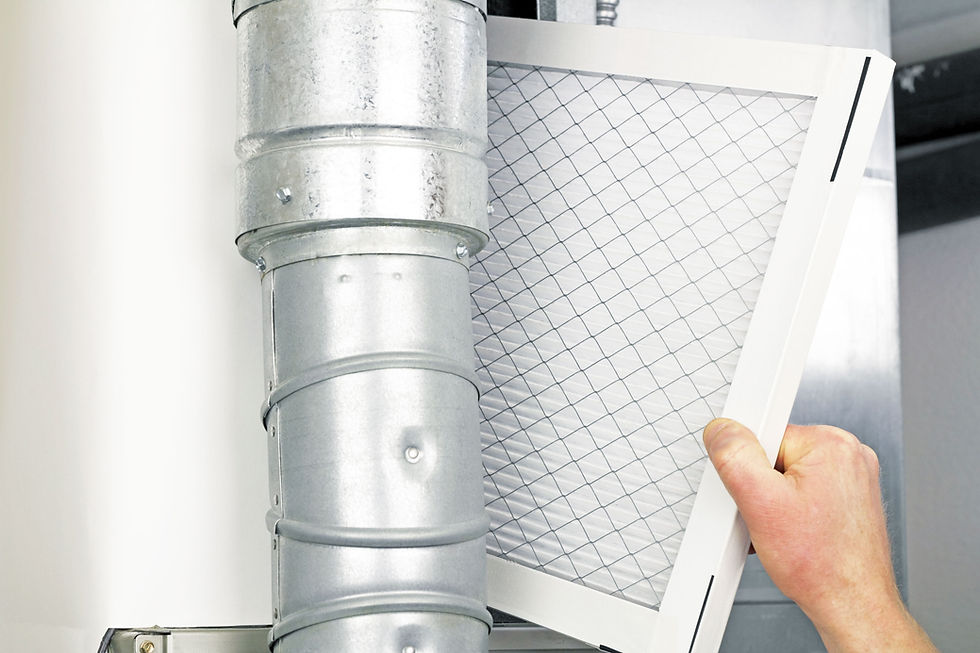Why Changing Furnace Filters Is So Important For The Health And Wealth Of Your Company
- daveb57
- Feb 5, 2024
- 3 min read

Every facility, regardless of size, needs consistent upkeep and maintenance throughout the year. Neglecting essential tasks like changing furnace filters can have detrimental effects on your employees' well-being and comfort, as well as the overall performance and longevity of your facility's heating and cooling equipment. Regular maintenance is crucial to avoid these potential issues.
What Is The Primary Purpose Of a Furnace Filter?
Although many people believe that the primary purpose of a furnace filter is to clean the air by trapping airborne contaminants, its actual job is to prevent these contaminants from entering your HVAC system. While the filter does contribute to better air quality by removing these contaminants for the system's benefit, its main function is to safeguard the HVAC system rather than solely focusing on improving air quality.
How Often Should Furnace Filters Be Changed?
The frequency of changing furnace filters varies from one facility to another, primarily depending on the type of filter installed. Filters are offered in a multitude of options, with different filter types impacting the recommended changing frequency.
The task of changing furnace filters ranges from a monthly to yearly basis, mirroring the diverse options available. Fortunately, there's no need for guesswork, as the manufacturer provides the recommended replacement frequency in the product information accompanying a new filter.
To provide a starting point for understanding the changing frequency, consider the size of the filter. Thinner filters, such as 1” ones, have less media to capture contaminants, requiring more frequent changes compared to 5” filters.
Additionally, filter efficiency, expressed as MERV (Minimum Efficiency Reporting Value), also plays a role. You should refer to your unit's documentation to identify the appropriate filter size and the recommended minimum efficiency reporting value MERV range for your furnace. It's crucial to match the filter specifications with your unit's requirements. Using a high MERV filter might be excessive for certain units, due to its extremely tight mesh, potentially leading to a situation akin to a clogged air filter, even shortly after replacement.
In general, here's the recommended frequency for changing furnace filters:
1” to 2” Filters - Replace every 1 to 3 months.
3” to 4” Filters - Replace every 6 to 9 months.
5” to 6” Filters - Replace every 9 to 12 months.
Some Factors That May Affect The Frequency Furnace Filters Are Changed
Occupancy
The occupancy of a facility directly impacts the effective service life of a furnace filter. In larger facilities, the task of changing furnace filters is more frequent compared to facilities with fewer occupants. The presence of more people in a facility introduces a higher quantity of contaminants to the environment. Therefore, in facilities with a greater number of occupants, the filter needs to be replaced more often to effectively capture the increased contaminants.
Traffic
The level of traffic in a facility can influence the overall lifespan of a furnace filter. Facilities experiencing higher levels of foot traffic, such as stores or storage facilities, may require more frequent changes of furnace filters. This is attributed to the increase in contaminants and pollutants brought in each time the door is opened.
Indoor Air Quality
In facilities with air quality issues, such as warehouses or factories, the longevity of the filter is compromised compared to facilities with satisfactory indoor air quality, such as a medical office or an attorney office.
Monthly Filter Checks!
A dirty filter can compromise comfort, health, energy efficiency, and the functionality of your HVAC system so schedule your service today. Ask about our Recurring Service!



